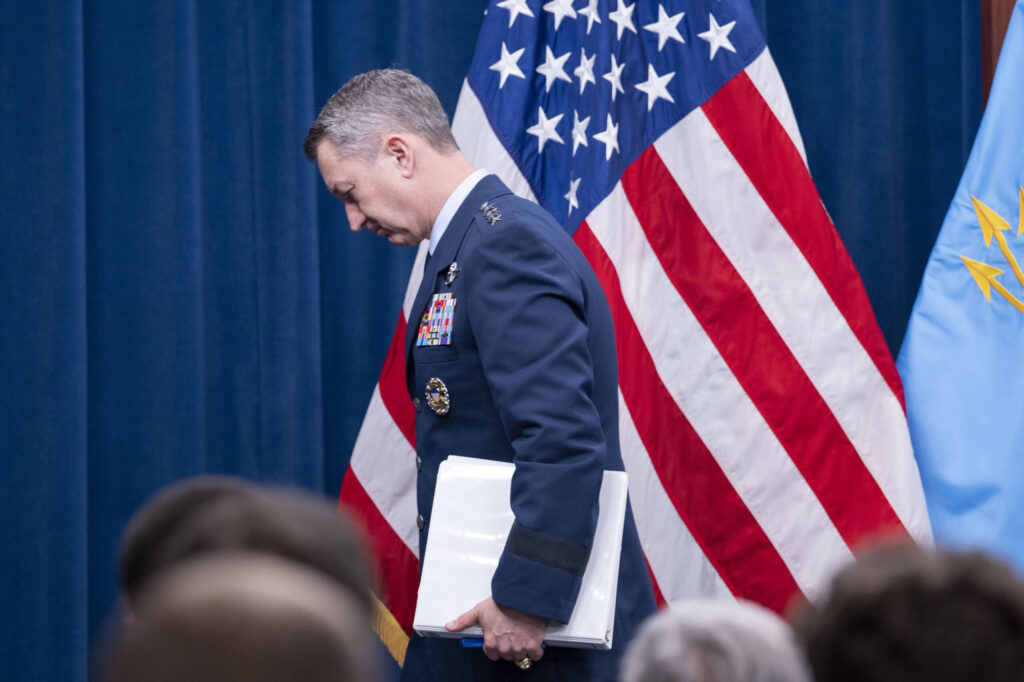
Joint Chiefs Chairman Gen. Dan Caine steps away from the podium following a news conference at the Pentagon, Thursday, June 26, 2025 in Washington. (AP Photo/Kevin Wolf)
As a military aviator and veteran of countless contingencies, I watched with bated breath and prayers in my heart on the evening of June 21 as Operation Midnight Hammer unfolded on live television. This 37-hour mission, involving cramped cockpits, radio silence, and the challenge of extreme ranges over enemy territory, was executed with remarkable skill and precision. I went to sleep that night proud to have been an American aviator and citizen, reflecting on my nearly four decades of military service.
What those airmen, guardians, sailors, and soldiers achieved was nothing short of miraculous, a feat no other country could have accomplished without a single casualty or mishap. However, the following morning brought a stark contrast. Instead of praise and pride, the airwaves were filled with criticism, as naysayers sought to find fault in the operation’s success.
Political Divides and Criticism
Even Senator Mark Kelly, a former astronaut and decorated naval officer, expressed skepticism, suggesting there was “no endgame in mind.” This sentiment seemed to reflect a growing polarization within America, where individuals appear more divided than united under the national motto “E Pluribus Unum.”
As a graduate of the Naval War College and the National War College, I take umbrage with such assessments. The primary lesson from these institutions is the importance of clearly defining the end state in warfare. President Trump articulated this end state as an Iran free of nuclear weapons, with objectives to demolish nuclear sites potentially beyond Israeli capabilities. These objectives were achieved with high certainty, thanks to meticulous planning and execution.
Media’s Role and Public Perception
The media’s portrayal of the operation was equally troubling. Reports unveiled classified information, promoting a preliminary intelligence report that suggested the nuclear sites were not destroyed. However, this report was labeled “low confidence,” and initial assessments are often incorrect. Moreover, the extensive years of preparation for this mission were largely ignored.
“The media’s job is to ask questions, but can’t they do so without misleading their audience?”
Instead of diminishing a significant American success, the focus should be on celebrating the Air Force and its joint partners for their achievements. The operation demonstrated remarkable coordination between allies, including Israel and the Gulf States, contributing to a significant step towards peace in the Middle East.
Historical Context and Future Implications
For the first time in decades, the threat of an Iranian nuclear weapon no longer looms over us. This accomplishment fulfills promises made by previous American presidents over the last 30 years. The more than 1,000 American lives lost to Iranian terrorism are finally being avenged, with a ceasefire that appears to be holding.
As we prepare to celebrate America’s 249th birthday, the hope is for unity as envisioned by our founding fathers. If we cannot put politics aside during such a moment of American accomplishment and leadership, the future of our republic may be in jeopardy.
Retired U.S. Air Force Lt. Gen. Rod Bishop, a veteran with nearly 6,000 flight hours, reflects on the importance of unity and celebration in the face of great achievements. As co-founder and chairman of Stand Together Against Racism and Radicalism in the Services, he emphasizes the need for a healthy nation to recognize and celebrate its successes.




